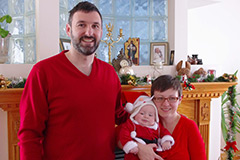The family project: pursuing an academic career and having children
By Alisa Kim
Near the end of 2012, Patrycja Thompson began her most interesting experiment: motherhood. “I really enjoyed my pregnancy. As an immunologist, I would research why I was feeling the way I did. If I felt tired, I’d be, ‘Oh, it’s because my natural killer cells are making new blood vessels!’” recalls Thompson, a PhD student in the lab of Dr. Juan Carlos Zúñiga-Pflücker, a senior scientistin Biological Sciences at Sunnybrook Research Institute.
Thompson is studying how Notch signalling drives early T cell development. T cells, which mature in the thymus, are a type of white blood cell that are critical in helping the body ward off disease. Although she had hoped to wrap up her research before her son was born, some of her experiments did not work. This setback exemplifies some of the concerns trainees may have when planning to have children. These include career uncertainty, financial difficulties and worrying about productivity on broken—if any—sleep. Here, she tells Alisa Kim how she’s juggling work and parenthood, and why it’s all worth it.
How are you adapting to being a new mom?
Pretty well, I think. There are lots of things you never expect. I thought babies slept a lot. I never realized that after the first month, they don’t, actually. I found it was the hardest at about 4 weeks of age. All of a sudden Konrad just would not sleep during the day. I also had no idea that babies don’t know how to fall asleep on their own—you have to teach them how to do it. That was probably the hardest time.
Why did you decide to have children?
I’m in my early 30s and everyone, including my doctor, was telling me if I wanted to have a child, I should really think about it, or start trying because it might take a while. I thought, why don’t we just try and see what happens? I thought I would have a few months’ buffer, but it happened right away. I was near the end of my PhD and thought I might even defend before having the baby. Even though I worked my butt off when I was pregnant—and I was lucky I felt well—some of my experiments failed to work. I wanted to do as many experiments as possible, because I knew once I had the baby, it would be hard to come back to the lab, and I was hoping to write my thesis at home. That was my plan, which didn’t really pan out.
How are you managing?
It’s hard. I had my mom stay with me for a couple of weeks at the beginning of December so I could go back to the lab. During the holidays, my husband, who is a teacher, had two weeks off, so I could run some experiments. It’s been very hard to get anything done. These days, Konrad goes to bed at 7 p.m., so there’s a window of ‘free’ time after that.
I have to finish my PhD this year. I have no other choice. I could’ve taken a leave of absence for a year, but the problem is that you don’t get paid a stipend. You’re in limbo with the university, and you’re not allowed to go back to the lab. I have two papers that are almost ready to come out and I don’t want to be ‘scooped.’ I want to get them published so that I can apply for postdoctoral funding.
Do you have advice for trainees who are thinking about having kids?
JC told me there’s never a ‘good’ time [to have children]. You’re always going to feel like you don’t have enough money, or you’re not ready, but there comes a point where you have to make a decision. Things will work out as long as you have support—from parents, your partner, friends. It’s easier if it’s the male who is in research and his partner stays home. It’s really hard for women. I knew that because [mothers] are the primary caregivers. When I was away for a few days in the lab, Konrad stopped sleeping at night. He’d wake up every two hours because he missed mommy.
What’s been the biggest surprise?
Breastfeeding is not as easy and natural as I thought it would be! I had to deal with undersupply at the beginning, then oversupply. Now I have a four-month-old who is too distracted to eat during the day, or refuses to eat because he’s teething, so I have to feed him alone in a dark room. That definitely took me by surprise. I always thought you just put a baby to a breast and voilà.
It’s surprising how interactive he is. When he was four weeks [old], we started to have conversations in his baby language. He laughs a lot. It’s amazing to see him develop and how he’s ‘obsessed’ with certain things. I remember the day he discovered his hands and now he’s onto something else: trying to put his feet in his mouth. It’s always something different.



